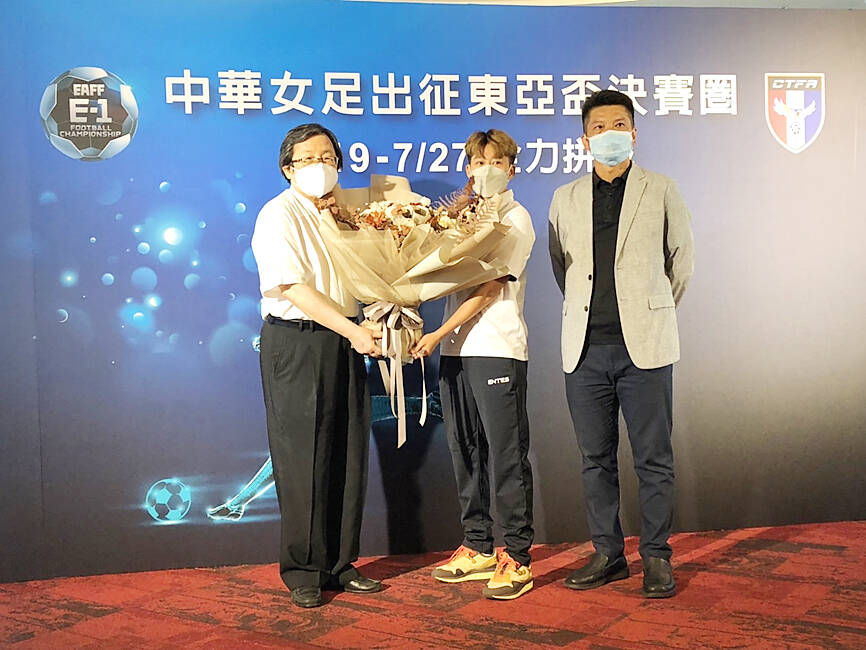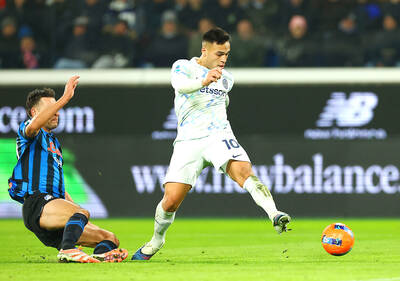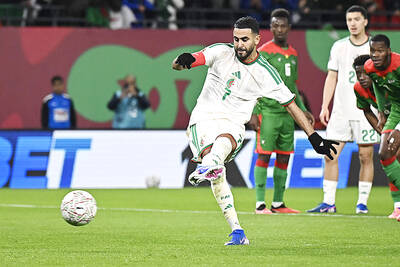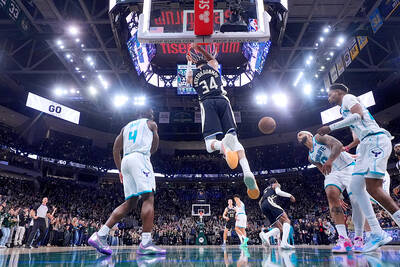The FIFA World Cup is one of the world’s most-watched sports events, including in Taiwan, where many fans are staying up late to catch the games live from Qatar.
However, unlike in many other countries, Taiwanese fans have never seen their national men’s team take part in a World Cup, and the women’s national team have only achieved the feat once, in 1991, when Taiwan reached the quarter-finals.
Taiwan’s women’s team still have a chance to qualify for next year’s Women’s World Cup, but the men’s team have never excelled internationally, ranking no higher historically than 121st in May 2018. They are currently ranked 157th.

Photo: Nian Miao-yun, Taipei Times
This lack of success at the global level is not surprising, given that baseball and basketball are far more popular and accessible in Taiwan than soccer, and offer many more opportunities for participation, recreationally and in organized groupings.
With the World Cup in progress, the Central News Agency talked to members of Taiwan’s own national soccer teams for their insight on ways they think the country’s domestic soccer environment can be improved to help the sport grow at home, even with the many barriers.
“First, we need to set up a professional soccer league. Baseball and basketball both have professional leagues, and you can see they are more popular and have bigger crowds at the games,” said Wu Chun-ching, the captain of Taiwan’s men’s team.
The seven-team Taiwan Football Premier League, played annually from March to November, is a semi-professional league that lags far behind basketball’s T1 League and P.League+, and baseball’s CPBL in attention and interest.
Without a professional soccer league, young players are less likely to continue with the sport, said Wu, who worries that Taiwan has many young players under 12 who are really talented, but might give up the sport after junior-high school to focus on other interests.
The fastest way to give young talented players an incentive to keep playing is to have a professional league, because they can see a future in the sport after graduating, he said. “If we can help these children be willing to continue with the sport, soccer in Taiwan will only get better and better.”
However, establishing a professional league would take more than just gathering the country’s top teams; it would also need to be backed with physical and organizational structures and facilities, Wu said.
For example, Taiwan needs more professional soccer pitches that are suitable for competition, because many of the fields are actually practice pitches, he said.
Having more fields to play on would also benefit local sports clubs, which are limited by their access to venues to stage matches, Wu said.
Wang Hsiang-huei, captain of the national women’s team, said she agreed with the need to bolster physical infrastructure, but also hoped Taiwan’s soccer community would have more of an international outreach, especially with “places like Europe, where they have a deep soccer culture we can learn from.”
“At the same time, we can start creating our own soccer culture,” Wang said.
Wang’s team are one of 10 to play a tournament in New Zealand in February to vie for the final three qualification spots for the Women’s World Cup.
They have to defeat Paraguay and then the winners of a game between Papua New Guinea and Panama to secure a World Cup berth.
“This is very important for Taiwan,” Wang said. “I really hope we will make use of this opportunity and qualify for the World Cup. It’s not just important for women’s soccer, but also great encouragement for younger generations.”
Yen Shih-kai, the head coach of the women’s team, said a big step forward would be to have a dedicated national training center.
“We train at any suitable location and it kind of feels like we’re homeless,” Yen said.
A national training center would allow players to live together as they train and save them travel time while reducing what Yen called a considerable waste of “administrative resources.”
“For example, we can’t always live in the same place where we train, so I have to spend a lot of time looking for places to stay [for my players] or for things like food and transportation, because the hotel will most likely not be next to the training pitch,” he said.
Holding more matches at home could have a big effect on the sport’s growth, he said.
“Our players need to perform well for Taiwanese fans to see,” Yen said. “It’s not easy for local fans to go overseas to watch our games, so to have international matches played in Taiwan is beneficial for both fans and the players.”
Due to the challenges of restrictions during the COVID-19 pandemic, no international teams have visited Taiwan in close to three years, but hopefully they would play friendlies in Taiwan as the rules ease, he said.
In the meantime, the ongoing men’s World Cup is keeping passion for soccer alive in Taiwan, so hopefully television, streaming platforms and the media keep providing resources for fans even when the games conclude with the final in Doha on Dec. 18, Yen said.

STILL IN THE HUNT: Rasmus Hojlund took his goal tally for SSC Napoli to nine as the champions cruised to a win at US Cremonese and stayed two points behind the leaders Inter on Sunday stayed at the Serie A summit after beating Atalanta BC 1-0 to maintain their slender lead over local rivals AC Milan. Lautaro Martinez netted the only goal of the game in Bergamo for Inter, who lead Milan, 3-0 winners against Hellas Verona thanks to Christoper Nkunku’s first Serie A goals, by a single point at the top of the division. The Argentina striker has scored in four consecutive league matches to end what has been a tricky year in positive style. “I ended last season in a lot of pain... I kept going during the Club World Cup and international

Algeria on Sunday became the third country after Egypt and Nigeria to qualify for the knockout stage of the Africa Cup of Nations by edging Burkina Faso 1-0 in Rabat through a Riyad Mahrez penalty. Defending champions Ivory Coast failed to join the trio after drawing 1-1 with Cameroon in a lively showdown in Marrakesh. Elsewhere, Mozambique ended a 39-match wait for a first victory by beating Gabon 3-2, while Sudan got back into contention for a last-16 slot by beating Equatorial Guinea 1-0 in Casablanca. Captain Mahrez converted from the penalty spot midway through the first half and Algeria then held on

Stan Wawrinka’s 40-year-old legs did not let him down over three-plus hours in his first singles match of a farewell tour yesterday. Three-time Grand Slam singles champion Wawrinka beat Arthur Rinderknech of France, who is ranked 29th to Wawrinka’s 157th, 5-7, 7-6 (5), 7-6 (5). The match went 3 hours, 16 minutes. Wawrinka last month announced that this year would be his last on the ATP tour. “Today was a tough battle ... it’s amazing to come here for the first time, to have so much support,” Wawrinka said yesterday. “Twenty years on tour, you kind of always play in the same place

BOUNCING BACK: Antetokounmpo had just returned from an eight-game injury absence last month, leading the Milwaukee Bucks to their third win in four games Giannis Antetokounmpo threw down the game-winning dunk with 4.7 seconds remaining to lift the Milwaukee Bucks to a 122-121 victory over the Charlotte Hornets and grab a slice of NBA history on Friday. The Bucks trailed by as many as 16 on their home floor, but Antetokounmpo scored 12 of his 30 points in the final quarter to help seal the win in a frantic finish that saw five lead changes in the final 45.7 seconds. The two-time NBA Most Valuable Player (MVP) added 10 rebounds and five assists. It was his 158th regular-season game with at least 30 points, 10 rebounds and